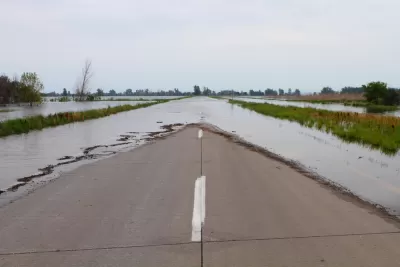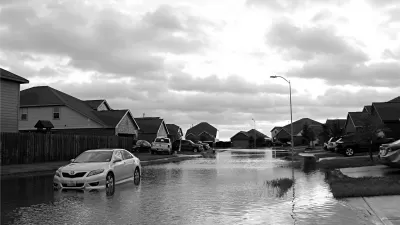The lack of disclosure laws in most states has led to an overvaluation of homes located in floodplains across the country.

Many American homeowners "remain unaware of the risks their properties face" because most states have nonexistent or inadequate flood risk disclosure laws, writes Jena Brooker for Grist. "This lack of transparency has created a false real estate market in parts of the U.S., according to new research from Stanford University and the University of North Carolina at Chapel Hill. The study, published in the journal Proceedings of the National Academies of Sciences, found there are almost 4 million single-family homes located in floodplains nationwide that collectively are overvalued by $44 billion based on their flood risk, or an average $11,526 per house."
Because land in floodplains is often cheaper, this disproportionately affects low-income families. "If you’re a household that invested a lot of money into a home in one of these places, we would be extremely concerned about the possibility of that home’s value dropping a lot and really wiping out a lot of wealth in communities that are vulnerable to begin with," says Miyuki Hino, lead author of the study and a professor at the University of North Carolina Chapel Hill. "Of the 10 states most at risk of severe flooding in the next 100 years, just three have flood risk disclosure laws — North Carolina, California, and Louisiana, according to data from the Natural Resources Defense Council."
"The scientists argue their new research isn’t just useful for studying flooding, but can also be applied to other climate change-related disasters that affect housing, including wildfires."
FULL STORY: Is your home in a flood-prone zone? In most states, you won’t find out until after you buy.

Rethinking Redlining
For decades we have blamed 100-year-old maps for the patterns of spatial racial inequity that persist in American cities today. An esteemed researcher says: we’ve got it all wrong.

Montreal Mall to Become 6,000 Housing Units
Place Versailles will be transformed into a mixed-use complex over the next 25 years.

Planetizen Federal Action Tracker
A weekly monitor of how Trump’s orders and actions are impacting planners and planning in America.

Seattle Safe Parking Site to Close, Relocate
A nonprofit leases lots during permitting stages to erect tiny homes and RV safe parking sites for unhoused residents. But the model means constant uncertainty and displacement.

LA ‘Mobility Wallet’ Increased Quality of Life for Participants
The city distributed a monthly $150 transportation subsidy to 1,000 low-income Angelenos. It dramatically improved their lives.

Texas, California Rail Projects Seek Out Private Funding
In the wake of Trump’s cuts to high-speed rail projects, rail authorities are looking to private-public partnerships to supplement their budgets.
Urban Design for Planners 1: Software Tools
This six-course series explores essential urban design concepts using open source software and equips planners with the tools they need to participate fully in the urban design process.
Planning for Universal Design
Learn the tools for implementing Universal Design in planning regulations.
City of Camden Redevelopment Agency
City of Astoria
Transportation Research & Education Center (TREC) at Portland State University
Regional Transportation Commission of Southern Nevada
Toledo-Lucas County Plan Commissions




























